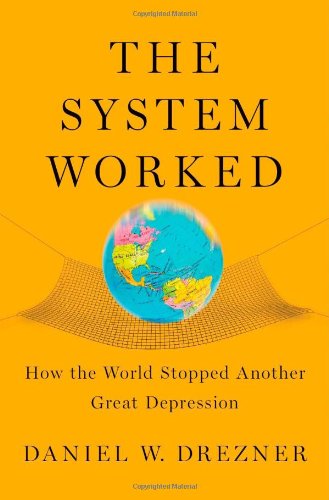So the assessment of what is broken, and what is not, at the global governance level continues among the experts.
First a rare corrective to the gloom-and-doom assessments particularly from the international media.
Dan Drezner recently released his book examining the response, especially of the G20 to the Great Recession. The book is entitled – The System Worked: How the World Stopped Another Great Depression.
Dan was well aware of the expert and media communities’ assessment of global governance efforts with the explosion of the Great Recession in 2007/8. While many experts grudgingly accepted that the G20 Leaders helped to pull the global economy back from the brink, most experts focus on the lack greater policy coordination since then. It appears to be all downhill from there as I noted in recent posts.
For some time now I have been mildly, according to some of the media, not so mildly berating the international media for their dismissal of G20 global governance efforts at the time of the Great Recession and since including various G20 Summits such as Cannes, Los Cabos, St. Petersburg and the upcoming November Brisbane Summit.
Now Dan’s position is clear and in contrast to these pessimistic conclusions. And he comes ‘out of the gate’ with a clearly positive message:
The punchline of this book is that the conventional wisdom is wrong. In response to the 2008 financial crisis – contrary to expectations – global economic governance responded in an effective and nimble fashion. In short, the system worked.
And a sort of mea culpa has emerged from one of the international media types, Alan Beattie at the FT. He writes:
I don’t agree with Dan Drezner. How could I? The thesis espoused in his latest book is that, all things considered, global economic governance worked well during the global financial crisis. I have expended much time, ink and pixels arguing the reverse. On the other hand, I have also learnt over the years that, if you find yourself disagreeing with Drezner, you need to take a good hard look at yourself and what you are doing with your life.
While Beattie’s judgement remains downbeat he nevertheless admits – that at least in contrast to the mob that tried and failed to staunch the Great Depression – these guys did a damn sight better in 2008:
Even the grumpiest curmudgeon could hardly doubt that the authorities did much better this time round, while noting that the response to the 1930s depression is an exceedingly low bar to clear. My objections are more questions of judgment than outright contradictions: I would contend that the responses were less impressive and certainly less systematic than are portrayed here.
Beattie in fact gives a thumbs up at least for the Central Bankers of our day that according to Beattie, “… simply called each other up and got on with it.” Beattie then makes clear that he holds no similar view for government officials. His conclusion: “The truth, as both of us admit, is that the record of global governance is patchy, and its results even now uncertain.
Now one of the reasons that Drezner accepts that there has been a more effective response is that he adopts a more ‘Iceberg Theory’ of global governance approach, examining the efforts not only of leaders but what Drezner calls the “the bevy of formal and informal institutions – the IMF, World Trade Organization (WTO), Bank of International Settlements (BIS), and the Group of Twenty (G20) nations – to coordinate action on a global scale”.
To some degree the difference in assessment of global summitry outcomes is based on a time frame. Tackling the crisis many would suggest that global governance efforts were passable. As officials worked our way out the acute aspects of the economic crisis, questions emerged, or reemerged, that the global summitry outcomes were inadequate. Moreover critics argued that the steam quickly ran out of coordinated global governance efforts. There is in fact a continuing question whether the G20 has been able, or in fact can make the turn from crisis committee to something like a steering committee for global global governance leadership. While I don’t agree with some of the critics at the FT or the FP, we still may be suffering from a lack of supply of global governance coordination in the global economy and certainly more broadly in the global security community.
Drezner suggests that past successful actions leads him to suggest – “there are reasons to be optimistic going forward.” He believes that there is more resilience in the system now though he admits that “fragility remain in the global economy.”
Drezner is suggesting, as I interpret it, that we are looking at a baseball game and the good guys are in the lead 1 to nothing. But there is a ways to go.


